In their playoff series against the Vegas Golden Knights, the San Jose Sharks are getting beaten in most every way imaginable. They are getting beaten at the start and beaten at the finish. They are getting beaten physically and mentally. Even when the Sharks have a man advantage, they can’t beat the Golden Knights; the Sharks’ power play has allowed two goals, which offsets the two they scored themselves.
If all this wasn’t bad enough, Sharks netminder Martin Jones has seen nine goals go by him in his last 66 minutes of play.
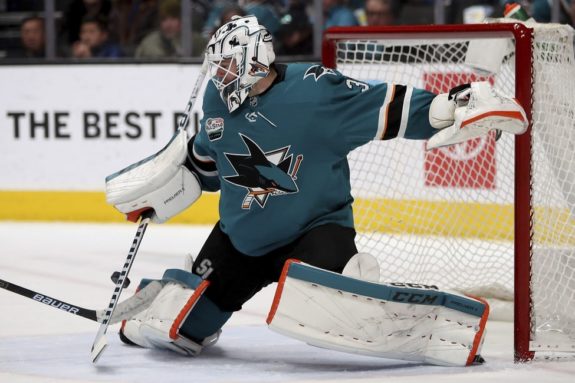
Even the officiating seems to want a piece of the Sharks, turning the series on a very controversial call in Game 2 which took a goal off the board for the Sharks and handed a power play to the Golden Knights (we also learned Vegas head coach Gerard Gallant does not know the color ‘blue’). This call may well have changed the outcome of the game, perhaps the series.
The Sharks are also physically beaten up. Joe Pavelski lost teeth while scoring a goal. Logan Couture nearly lost his ability to have Logan Couture Jr.
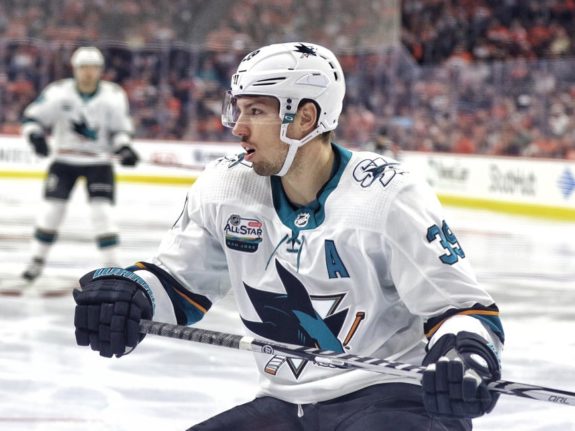
Micheal Haley blocked a shot early in Game 3 around his ankle and did not return. Marc-Edouard Vlasic left early in the second period of Game 2 when a puck hit him up high and he also missed Game 3. Erik Karlsson is not even close to healthy.
All this makes one wonder why Sharks’ top line forward Evander Kane decided to fight the Golden Knights’ fourth line forward Ryan Reaves late in Game 3. While Kane is plenty tough, Reaves is plenty tough, too, and bigger than Kane. The Sharks are not healthy and there is no reason to add to the risk.
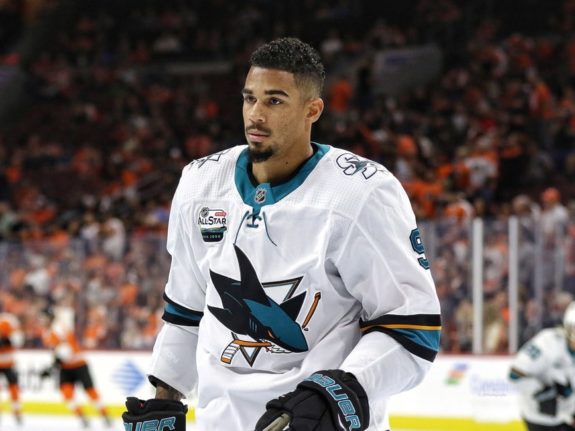
And before I forget, the series stands with a two games to one advantage in favor of the Golden Knights. It is hardly an insurmountable lead, but Vegas is sailing on smooth waters with the wind at their back while the Sharks are fighting against it in the midst of a storm.
The Golden Knights Trend Line
What is clear, the series is tipping more and more towards Vegas with each game. The Sharks played very effectively for two periods in the series opener. Since then, Vegas has had the better play. In Game 3, they were dominant.
There is analysis to be done, but at some point, it comes down to Vegas being faster, stronger, smarter and healthier. Their goaltending is better, their defense is better and their forwards are better. Vegas is playing with more confidence and greater poise.
The Penalty Metaphor
Two sets of penalties act as a metaphor for the series. There were two interference penalties called in Game 3. One was called against Alex Tuch, the powerful Vegas forward who steam-rolled Sharks defenseman Justin Braun. The other was called against Kevin Labanc, the smallish Sharks forward who attempted to nudge a Vegas defender on a soft pick.
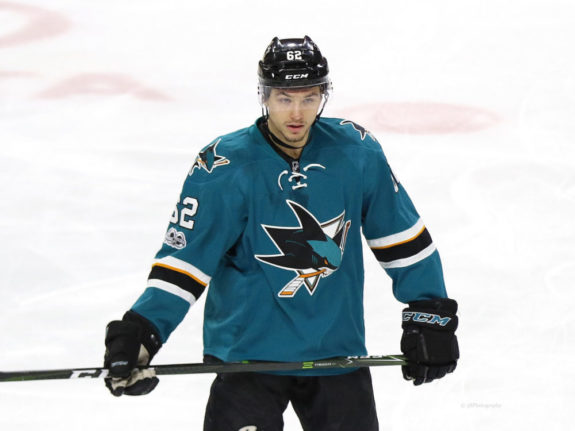
There were also two notable headshots in the game. Joe Thornton was called for his hit on Tomas Nosek. Thornton served a two-minute minor, and subsequently the NHL’s Department of Player Safety suspended him for Game 4. Brayden McNabb clocked Justin Braun in the head and got nothing for it. Not a penalty, not a call from the league.
The side-by-side comparison tells a key piece of the story. Vegas is playing large and doing damage while the Sharks are playing small and paying the price.
Erik Karlsson
One major Sharks’ problem is the health of Erik Karlsson. The star defenseman clearly is not healthy and it shows. His play has declined in each game of the series. Vegas scored 11 goals in Games 2 and 3, Karlsson was on the ice for nine. At his best (which we saw earlier this season), Karlsson is the Sharks’ best player, among the league’s best players, and can change a series. The compromised version of Karlsson playing against Vegas is a liability.
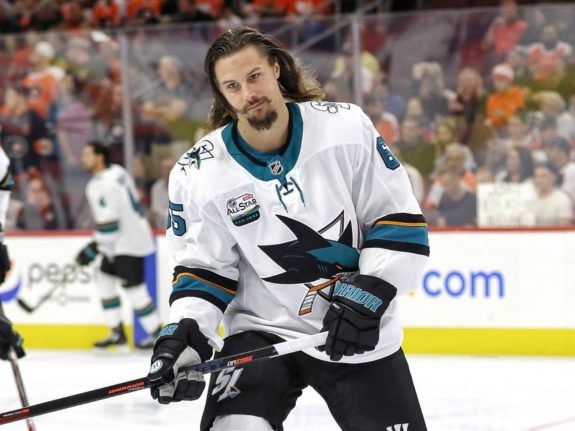
Sharks Checklist
Before the series began, we provided a checklist which the Sharks needed to follow for success in the series. They were reasonably good in the series opener, but they’ve missed ever since. The power play is a disaster. The defense is allowing a lot of odd-man rushes (Martin Jones was good against these in the final period of Game 1, not so good since). On offense, the team is not going behind the net as much as they need to. And Jones has not been great.
We included poise and focus in the checklist. Giving up goals in the opening minute of each period in Game 3 gives us clear insight into this issue. We mentioned the Sharks’ top line needed to play well. Pavelski, Couture and Timo Meier are a combined minus-nine.
We included Peter DeBoer’s choices. Putting Haley (he of 10 NHL goals in nine NHL seasons) on the ice for Game 1 made little sense, but the Sharks played well (with Haley exceeding his very low bar) and the team won. DeBoer went against the odds again in Game 2 and it backfired.
Unlike Game 1, where the Sharks played with a lead, in Game 2, the Sharks needed to make a comeback and the offensively-challenged Haley was not useful while the useful player, Joonas Donskoi, did not play. Haley got the start over Donskoi again in Game 3, which, as mentioned, Haley exited after blocking a shot. In games where the Sharks are playing from behind, it helps to have another player capable of creating offense. Donskoi can, Haley can’t.
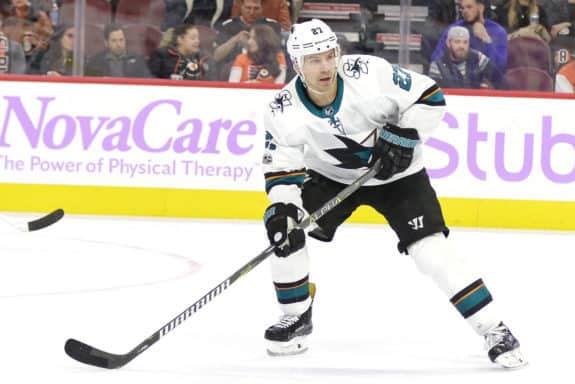
Game 4 and Beyond
For Sharks fans, doom and gloom abound. Many are already resigned to what appears inevitable, an exit in five games, six among the optimists. It would be easy to write off Game 3 as a bad game, but it seems much more than that.
The Golden Knights are the better team, the healthier team and the team with no one serving a suspension for Game 4. The Stanley Cup Playoffs are often called a battle of attrition and the Sharks have already attrited a lot.
More to the point, it is hard to see how the Sharks turn this around. Perhaps Jones can suddenly find his game or his opposing number, Marc-Andre Fleury can lose his. Perhaps the Sharks can re-commit to stopping odd-man rushes. On offense, they can go behind the net. Vlasic might return, the power play can find it’s groove, etc. etc. etc. Right now, none of this looks likely and with games coming every other day, time is not on San Jose’s side.
The bottom line is simple enough. The Sharks must get better very quickly, or their season will end very soon.
Zeke’s Notes
The opening period of Game 2 was one of the most entertaining periods of hockey I’ve ever witnessed.
Games always start off with an intensity in the Shark Tank and this was no different. The place was hopping at the start, especially with the tail wind of the Game 1 win. Then Vegas scored three goals in the game’s first six minutes. In the process, the Sharks flummoxed a 5-on-3 power play, then immediately allowed a short-handed goal when Colin Miller returned to the ice. The crowd was shell-shocked and starting goalie Jones was pulled for Aaron Dell.
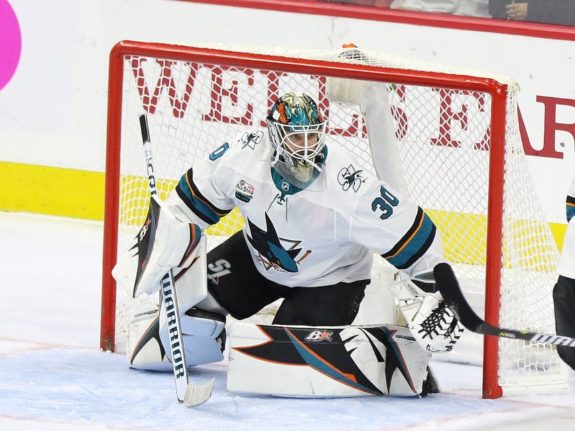
One could sense a little hope creep into the crowd as the Sharks controlled their share of play over the next several minutes. Optimism returned when the Sharks netted their first goal during 4-on-4 play to make it 3-1. The Sharks pulled within a goal moments later on the power play and the venue roared. The Sharks tied the game in the final minute and the Shark Tank was as loud as it has ever been.
The amazing comeback fell short. The Sharks had a goal disallowed in the opening minute of period two and were called for a penalty instead. Vegas took the lead on the ensuing power play and held it the rest of the way, winning 5-3. Had things played out differently, the memory of the opening period of Game 2 would have gone down as one of the most epic in Sharks history. Instead, it is likely to be lost among the memories.